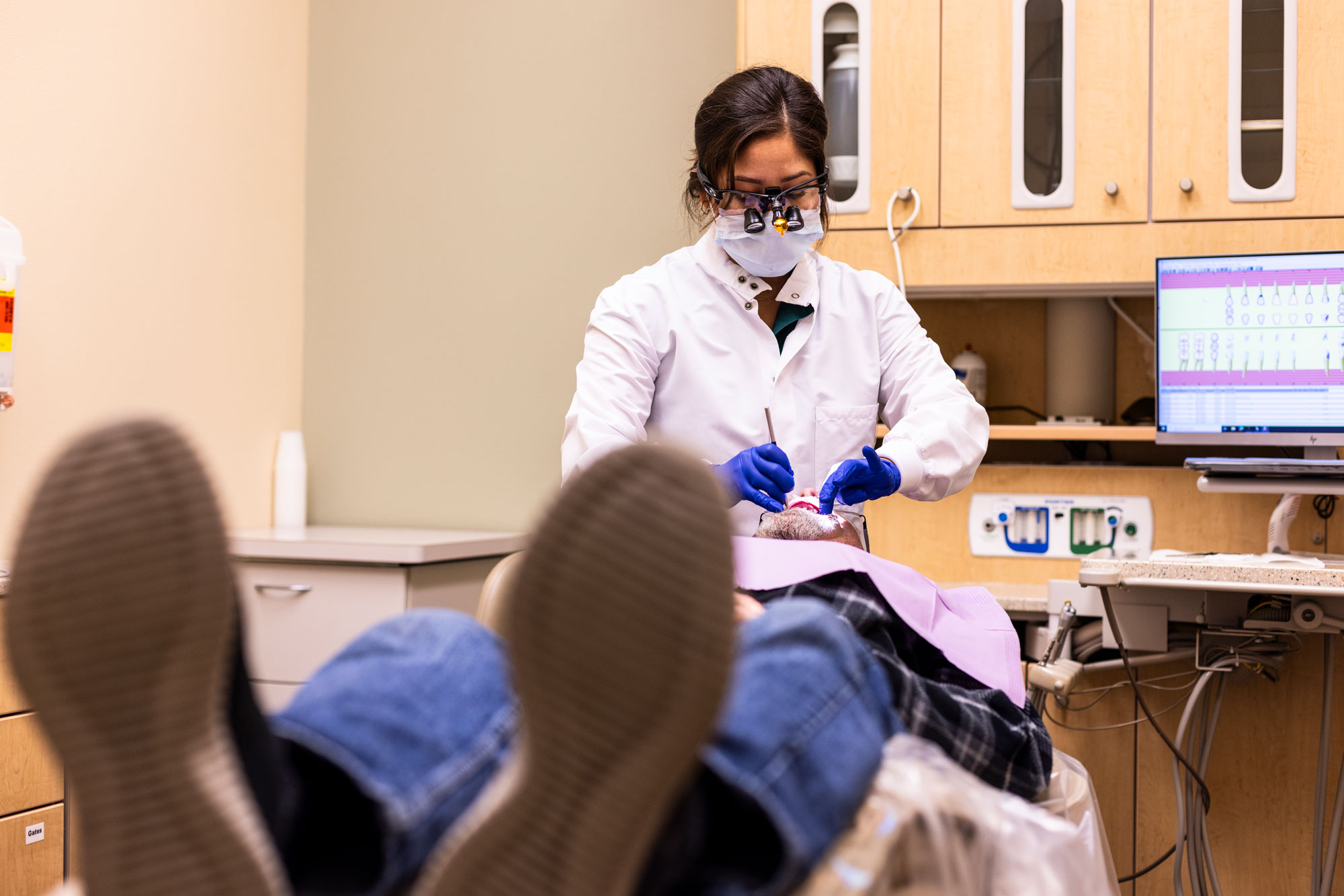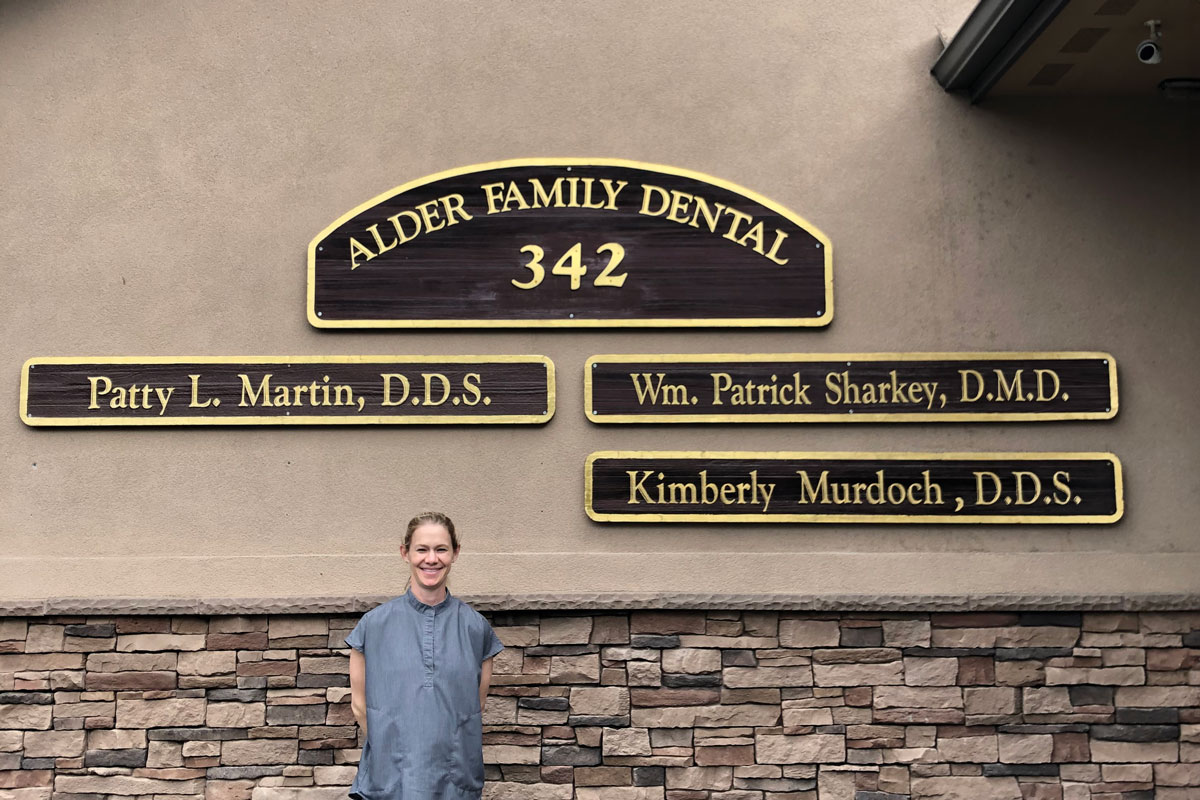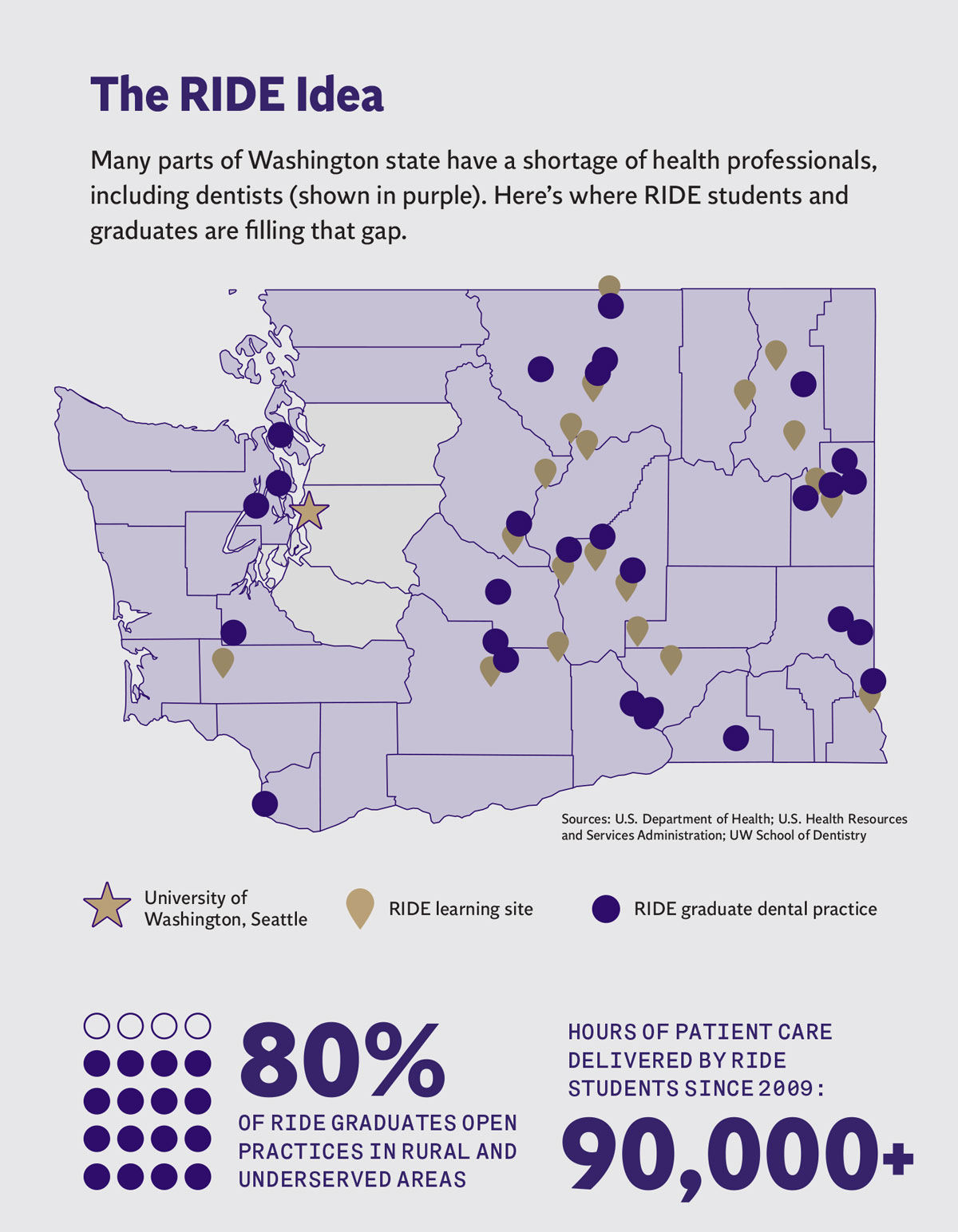Filling a need Filling a need Filling a need
A UW rural dentistry program trains graduates to practice in small communities—meeting the demand for dental care across Washington state.

A UW rural dentistry program trains graduates to practice in small communities—meeting the demand for dental care across Washington state.
Working as a flight attendant after college, Patty Martin, ’12, was on a layover in Sitka, Alaska, when she received the call she’d been hoping for from the University of Washington School of Dentistry: She’d been accepted to the inaugural class of the Regional Initiatives in Dental Education (RIDE) program, a special cohort of dentistry students trained to practice in rural communities.
The UW’s innovative RIDE program fills a critical need for our region. Dentists are in high demand nationwide, but especially in rural areas like eastern and central Washington. In RIDE, UW dental students get practical experience in rural community clinics, preparing them for the challenges of practicing in remote locations. And they benefit from the professional network RIDE has built throughout the Pacific Northwest, offering expertise via new technologies and mentorship from among generations of dentists.
Even as a teenager, Martin had set her sights on dentistry. Interested in science and in people, she’d started making an alphabetical list of potential careers, but she never got past “D.” While having her teeth cleaned, she asked her dentist about his job—and he invited the teenager to shadow him, an experience that would eventually shape her career path.
Martin was elated to start dental school with the UW School of Dentistry and RIDE. Though she’d grown up in the Seattle suburbs, she felt at home training in eastern Washington—drawn to the sunshine, the rugged landscapes and the communities small enough that she could see the impact of better oral health care on her patients and their families. Good oral health is about much more than fighting cavities and encouraging flossing: Dentists can spot the signs of many critical health conditions such as diabetes, cancers and high blood pressure. Martin valued her role in the community’s health.

Patty Martin, ’12, at her practice in Walla Walla.
A dozen years later, Martin has built a thriving dental practice in Walla Walla. “If you can change someone’s life or leave a little piece of you along the way, I think that’s fulfilling,” she says. “What’s great about dentistry is you get the chance to have those interactions.”
About 15 years ago, leadership at the UW School of Dentistry wanted to develop a program modeled after the success of UW School of Medicine’s WWAMI, the medical education program serving the five-state region of Washington, Wyoming, Alaska, Montana and Idaho. RIDE, which was first funded by the Washington Legislature in 2007 and benefits from philanthropic support, similarly trains students to practice in rural and remote areas and connects them with working health care professionals across the region. By providing world-class training in small communities, the UW is helping to address our state’s critical health care needs while also creating career paths for the next generation of providers.
“We’re trying to improve access to care, particularly in rural sites in Washington and the five-state region,” says RIDE Director Frank Roberts, who’s also the School of Dentistry’s associate dean for regional affairs. “The rural areas have a lot of challenges.”
The demand is so high that the UW secured $2.5 million in state funding to expand RIDE from 32 to 64 students beginning in the 2024–25 school year, doubling the number of graduates and expanding into rural western Washington.

And thanks to funding from the U.S. Department of Agriculture, RIDE has technology to connect community clinics to UW dental specialists and to enhance the classroom experience for first-year RIDE students, who are based in a high-tech classroom on Eastern Washington University’s Spokane campus. Some classes are held over Zoom with professors in Seattle; others are taught by faculty in Spokane. This arrangement gives RIDE students in the eastern part of the state access to dental labs, in shared space with EWU’s dental hygiene program.
In RIDE, UW dental students get practical experience in rural community clinics, preparing them for the challenge of practicing in remote locations.
RIDE students’ first year ends with a four-week rotation in a community clinic in eastern or central Washington. Second- and third-year students take classes on campus in Seattle, although the program is seeking funding for second-year students to remain in Spokane. In their final year, RIDE students are placed with a rural dental clinic, where they hone their clinical and professional skills under the supervision of UW affiliate faculty.
The daughter of Spanish-speaking farmworkers, Mariany Morales grew up in Yakima, not far from the community clinics where RIDE students get real-world training. As a junior at Washington State University, Morales attended an information session about RIDE where she heard students describe their experiences training in small communities across the state. “I was blown away,” she says. “It was very heartwarming.” She recalls thinking, “This sounds like exactly what I want to do for my career.”
After earning her Doctor of Dental Surgery degree in 2021, Morales began her professional career an hour north of her hometown at the Quincy Community Health Center. She was drawn by the challenge of caring for the community’s complex needs. Specialty care may be readily accessible in big cities like Seattle, but it can be out of reach for patients in remote parts of the state. Cost, distance, language barriers and lost wages can be insurmountable barriers.
Plus, working in Quincy has other benefits over being in a big city. Morales often cares for multiple generations of the same family, patients she’s likely to bump into while grocery shopping. She lives minutes away from the clinic, and the town can feel like an extended family.
The trust she builds with patients, often speaking Spanish with them, translates to better outcomes. “If they don’t feel that comfort,” Morales says, “some people just won’t return and won’t get that treatment.”
Like Morales, 80% of RIDE graduates go on to develop practices in rural and underserved areas, a trend that far surpasses the national averages, says RIDE Director Roberts. “They get a chance to be really important and matter in that community, to have a big role in leadership with the young people in the community toward education and considering professional careers,” he says.
The UW is now working to improve telehealth options in the community clinics, enabling access to experts who can help assess if a case can be managed locally or requires specialty care in a larger city.
“It saves everybody a lot of time and money—and it saves the health care system money too,” Roberts points out.
For Morales, it’s about the good feeling she gets knowing she helps people improve their health. She enjoys meeting the diversity of people who fill her practice—and learning from them. And she looks forward to one day helping train the next generation of dentists.
“I love the RIDE program and everything it stands for,” Morales says. “It’s doing great things and preparing people to come back to these rural communities and make a difference in other people’s lives.”